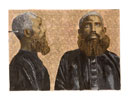"The G8 series"
This entire body of work was censored by Vietnam Ministry of Culture in November 2007
.jpg)
.jpg)
During an extended stay in Hanoi in 2006 when Kristine McCarroll was researching the period of French colonization of Vietnam for her series 'Le Temps Benis des Colonies/The Good Ole Times in the Colonies', she witnessed first hand the build-up to the 2006 APEC meeting which took place in Hanoi in November that year. This prompted her to wonder at the relationship, if any, between the G8 and the APEC groups, the effect of their decisions on the cultures and the people of the countries represented and others excluded.
In November 2007, at the eve of McCarroll's large solo exhibition at Art Vietnam gallery in Hanoi, the Vietnamese Ministry of Culture in Hanoi censored all the paintings of the G8 series. While Vietnam pursues a market economy, it holds fast to its communist political system and the absence of freedoms like free speech. The Ministry of Culture would not tolerate any threat to the aid monies expected from the G8 members. In a country like Australia, where free speech and a right to protest are assumed to be natural rights, it is difficult to appreciate how 'radical' this work is considered in Vietnam, where such open ridicule and humour are completely unacceptable.
The G8 is an annual meeting of a group of leaders of the world's eight wealthiest and most powerful countries - The USA, Germany, France, the UK, Italy, Canada, Japan and Russia. The majority are democracies with capitalist economies. On the face of it, their intentions are to find solutions to the world's problems, including the alleviation of poverty, starvation and global warming. This is on the one hand a blunt rejection of the effectiveness of the UN in these areas, and on the other a confirmation of the 'us and them' mentality of the haves and have-nots, the first and third world economies. Solutions are sought through a process of exclusion, not inclusion, as the leaders of those peoples suffering the worst of these problems are excluded from the process. One could be forgiven for wondering if these apparently altruistic intentions might be compromised by economic self-interest and a preservation of the status quo in terms of the hierarchy of world power.
The other grouping of world leaders - APEC (Asia Pacific Economic Co-operation) - may see itself as in some way making up for this exclusion, although four of the G8 countries (Japan, Russia, Canada and the USA) are represented in this current group of 21 countries. In Hanoi, the APEC meeting was clearly seen as a money-spinner, mostly in the very short term.
The increasing economic development of Vietnam is heavily financed by investment coming from many of the G8 countries. Vietnam is already showing signs of globalization. Consumerism is rampant amongst the middle class. Money is flowing more freely and those who have it are flashing external signs of wealth. However, with the pursuit of wealth and the growing migration from country to city, Vietnam's family and village-based cultural roots are being seriously disturbed. In McCarroll's eyes, globalization is fast 'robbing' Vietnam of its culture with its inherent gluttonous race for economic prosperity at all cost. After surviving long periods of colonization, could Vietnam's culture withstand the much more insidious threat of globalisation? A blatant example are the ritual offerings to the ancestors which consist not only of burning "josh' paper but also fake US banknotes as well as very sophisticated representations, made of paper, of all the newly accessible consumer goods. Some of these offerings are collaged into McCarroll's work.
The idea of cultural 'theft' led her to the use of original mug shots sourced from the archives of the Ecole Francaise d'Extreme Orient (an organisation which has compiled all the documents pertaining to the French colonisation period). The idea of gluttony finds piercing expression in "La Grande Bouffe du G8", which refers to Marco Ferreri's famous 1973 movie and most incisively to Leonardo's iconic European Renaissance masterpiece. There is much wry humour in McCarroll's reinterpretation of the constant political rhetoric to which we are subjected each day : she has a keen eye for the absurdity of the political grandstanding that passes for policy in many parts of the world today!
-panel-of-9 copy.jpg)

-pa copy.jpg)